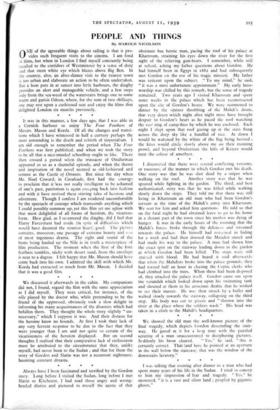Always have I been fascinated and terrified by the Gordon
story. Long before I visited the Sudan, long before I met Slatin or Kitchener, I had read those angry and wrong- headed diaries and pictured to myself the agony of that obstinate but heroic man, pacing the roof of his palace at Khartoum, straining his eyes down the river for the first sight of the relieving gun-boats. I remember, while still at school, asking my father questions about Gordon. He had himself been in Egypt in 1882 and had subsequently met Gordon en the eve of his tragic mission. My father was reticent upon the subject. "To my mind," he said, "it was a most unfortunate appointment." My early hero- worship was chilled by this remark; but the sense of tragedy remained. Two years ago I visited Khartoum and spent some weeks in the palace which has been reconstructed upon the site of Gordon's house. We were summoned to dinner by the sinister throbbing of the Mahdi's drum, that very drum which night after night must have brought despair to Gordon's heart as he paced the roof watching the vas* ring of camp-fires by which he was enclosed. Each night I slept upon that roof gazing up at the stars flung across the deep sky like a handful of rice. At dawn I would be wakened by the whine of the flag being hoisted ; the kites would circle slowly above me on their morning prowl; and beyond Omdurman the hills of Kercre would turn the colour of amethyst.








































 Previous page
Previous page